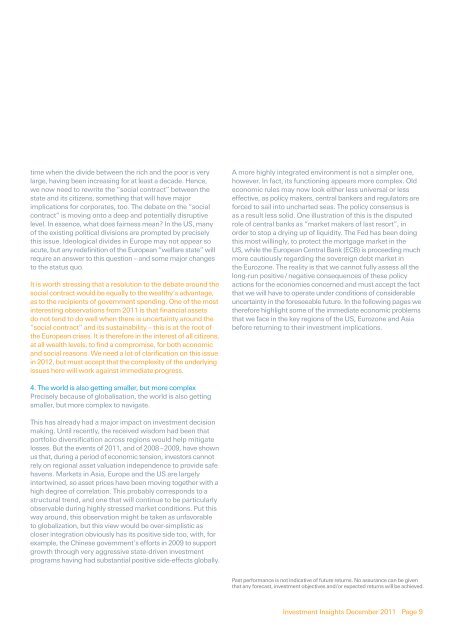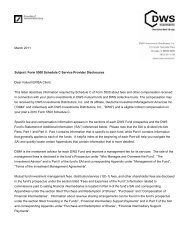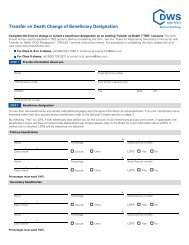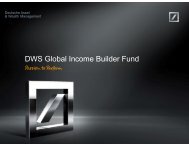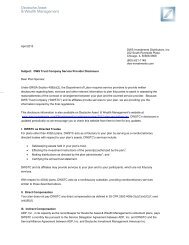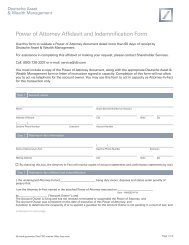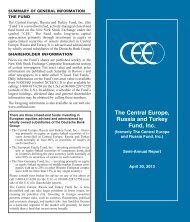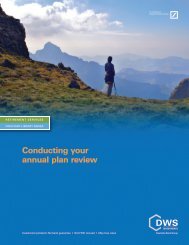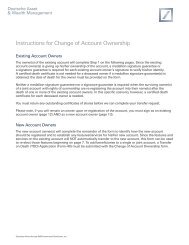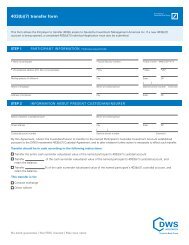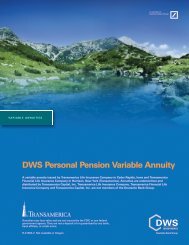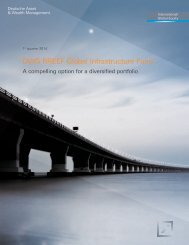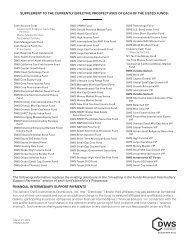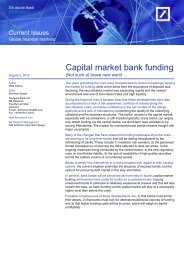Investment Insights Dezember 2011 - DWS Investments
Investment Insights Dezember 2011 - DWS Investments
Investment Insights Dezember 2011 - DWS Investments
Create successful ePaper yourself
Turn your PDF publications into a flip-book with our unique Google optimized e-Paper software.
time when the divide between the rich and the poor is verylarge, having been increasing for at least a decade. Hence,we now need to rewrite the “social contract” between thestate and its citizens, something that will have majorimplications for corporates, too. The debate on the “socialcontract” is moving onto a deep and potentially disruptivelevel. In essence, what does fairness mean? In the US, manyof the existing political divisions are prompted by preciselythis issue. Ideological divides in Europe may not appear soacute, but any redefinition of the European “welfare state” willrequire an answer to this question – and some major changesto the status quo.It is worth stressing that a resolution to the debate around thesocial contract would be equally to the wealthy’s advantage,as to the recipients of government spending. One of the mostinteresting observations from <strong>2011</strong> is that financial assetsdo not tend to do well when there is uncertainty around the“social contract” and its sustainability – this is at the root ofthe European crises. It is therefore in the interest of all citizens,at all wealth levels, to find a compromise, for both economicand social reasons. We need a lot of clarification on this issuein 2012, but must accept that the complexity of the underlyingissues here will work against immediate progress.A more highly integrated environment is not a simpler one,however. In fact, its functioning appears more complex. Oldeconomic rules may now look either less universal or lesseffective, as policy makers, central bankers and regulators areforced to sail into uncharted seas. The policy consensus isas a result less solid. One illustration of this is the disputedrole of central banks as “market makers of last resort”, inorder to stop a drying up of liquidity. The Fed has been doingthis most willingly, to protect the mortgage market in theUS, while the European Central Bank (ECB) is proceeding muchmore cautiously regarding the sovereign debt market inthe Eurozone. The reality is that we cannot fully assess all thelong-run positive / negative consequences of these policyactions for the economies concerned and must accept the factthat we will have to operate under conditions of considerableuncertainty in the foreseeable future. In the following pages wetherefore highlight some of the immediate economic problemsthat we face in the key regions of the US, Eurozone and Asiabefore returning to their investment implications.4. The world is also getting smaller, but more complexPrecisely because of globalisation, the world is also gettingsmaller, but more complex to navigate.This has already had a major impact on investment decisionmaking. Until recently, the received wisdom had been thatportfolio diversification across regions would help mitigatelosses. But the events of <strong>2011</strong>, and of 2008 – 2009, have shownus that, during a period of economic tension, investors cannotrely on regional asset valuation independence to provide safehavens. Markets in Asia, Europe and the US are largelyintertwined, so asset prices have been moving together with ahigh degree of correlation. This probably corresponds to astructural trend, and one that will continue to be particularlyobservable during highly stressed market conditions. Put thisway around, this observation might be taken as unfavorableto globalization, but this view would be over-simplistic ascloser integration obviously has its positive side too, with, forexample, the Chinese government’s efforts in 2009 to supportgrowth through very aggressive state-driven investmentprograms having had substantial positive side-effects globally.Past performance is not indicative of future returns. No assurance can be giventhat any forecast, investment objectives and/or expected returns will be achieved.<strong>Investment</strong> <strong>Insights</strong> December <strong>2011</strong> Page 9


